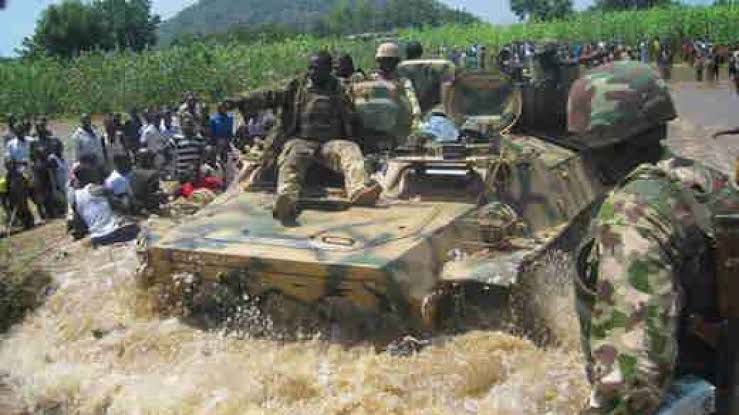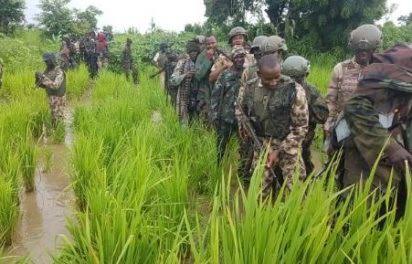How Rainy Season Aids Boko Haram Fighters
The seasonal African monsoon gives Boko Haram fighters a chance to invest in farming, generate revenue through increased ambushes, and recuperate from intense fighting with the military and prepare for another round of fighting in the dry season.

With the arrival of the first rain, sometime in May, the wheels of armoured tanks and other military vehicles come to a near halt and fighter jets rarely take off due to bad weather. The 10-year-old insurgency in Lake Chad experiences a lull and the fighters congratulate themselves for witnessing the season.
As HumAngle gathered, Boko Haram fighters are so unaffected during the rainy season that hundreds of fighters withdraw from the war front and take up farming to grow their food banks.
The rain also offers Amnesty
As noted by the U.S. Department of State, rainy weather is but one of various factors which seemingly reverse any gains made by the Nigerian government against Boko Haram.
Areas such as Marte, Dikwa, Alagarno, and Sambisa forests, are among the most treacherous locations for both the Islamic State West Africa Provence (ISWAP) and the Jama’atu Ahlil Sunnah Lil Da’awatu Wal Jihad or Boko Haram, thrive during the rains.
The areas are flooded and become muddy like quicksand, overgrown with grasses which makes it difficult for any army to move in that environment.
The environment, generally, in the Lake Chad basin, is tropical with a wet season. The rains, which are brought by the African monsoon, start from May and run through early October.
The insurgents are equally affected as much as the military fighting to stop them.
However, HumAngle learned that the insurgents require minimum equipment, such as light weapons, Improvised Explosive Devices on motor bikes to attack their targets. But the military, by their training rely on heavy platforms, such as air surveillance, fighter jets, armoured tanks and gun trucks to get rid of their opponents in the battle field.
A close look at the last three years shows that most of the massive attacks carried out by Boko Haram or the military in the region were in the dry season with few exceptions. However, there is a sharp rise in ambushes by the insurgents to abduct commuters or rob them of their valuables during the season.
Sources within the Boko Haram insurgency said that the fighters were equally limited in the rains. “Intense downpours, floods and overgrown grasses affect the movements of everyone, only the locals have a way to navigate their way around,” the source said.
An active Boko Haram fighter said, “bombs from military jets are ineffective in the rainy season, they require hard ground for maximum impact, there are no hardgrounds in the rainy season, everywhere is muddy, so we use the unexploded bombs as raw materials to make more bombs.”

Military Must Change Strategy
HumAngle learnt that even the ongoing deployment of military hardware widely reported in the media, “are not compatible with the demands of the terrain in the Lake Chad, most of the equipment are wheeled vehicles” said a senior military officer.
Most of the vehicles the military use operate on wheels, “even during the dry season in desert areas wheels are difficult to move let alone in the rainy season,” said the senior military officer.
In effect, the military has no option but to adopt a defensive and offensive strategy and the insurgents, in turn, have adapted to this strategy “and have found ways around it. This is one of the main reasons this war has dragged for over 10 years without end,” said the officer.
For the Nigerian Army, HumAngle gathered from knowledgeable sources in the war front that Nigeria needed to move away from a defensive-offensive strategy with equipment that is not compatible with the region to an offensive-offensive strategy with amphibious equipment.
HumAngle gathered that after the attack on a Naval base in Baga, Borno State, in December 2018, the Nigerian Navy never went back.
“The Navy was never used to a shallow lake like what obtains in the Lake Chad,” which depth varies based on seasonal rainfall.
“The Nigerian Navy is trained for deep-sea operations as it is the case in the Niger Delta,” a military source said.
“An offensive-offensive strategy means troops don’t retreat, they sustain their attacks and rely on reinforcements until they achieve their objectives,” said a senior military officer.
The officer explained that this strategy was so far missing because of “poor and inadequate equipment, poor coordination between the armed forces and security leaders.”
However, the Chief of Army Staff (COAS), Lt.-Gen. Tukur Yusuf Buratai, charged his troops in the battle ground last week that from now on “it is forward ever, backward never.”
Could these words mean a change in strategy or merely a moral booster to an exhausted force?
The Nigerian military must now “think out of the box and beyond the box,” Buratai said.
Buratai has to be quick, said knowledgeable sources in the Northeast. “We have just a few weeks to the commencement of the rainy season,” they said.
The dynamics in the Lake Chad region and Northeast Nigeria during the rains are not necessarily that Boko Haram has an advantage over the military. Both forces are limited. But Boko Haram fighters are subjected to fewer attacks during the season as the military retreats to defend its facilities.
This period gives the terrorists time to regroup, strategize, recuperate and raise funds to fend off attacks during the dry season, HumanAngle gathered.
Meanwhile the Nigerian Army on Sunday said its operatives killed 105 Boko Haram insurgents during its operations in Yobe State.
The acting director of army public relations, Sagir Musa, in a statement circulated to journalists in Damaturu, said the operations took place on the fringes of Buni Gari less than 7 km from the 27 Task Force Brigade in Buni Yadi, in Yobe state.
Support Our Journalism
There are millions of ordinary people affected by conflict in Africa whose stories are missing in the mainstream media. HumAngle is determined to tell those challenging and under-reported stories, hoping that the people impacted by these conflicts will find the safety and security they deserve.
To ensure that we continue to provide public service coverage, we have a small favour to ask you. We want you to be part of our journalistic endeavour by contributing a token to us.
Your donation will further promote a robust, free, and independent media.
Donate HereStay Closer To The Stories That Matter





Well written with insightful analyses and Intel. Carry on brothers.